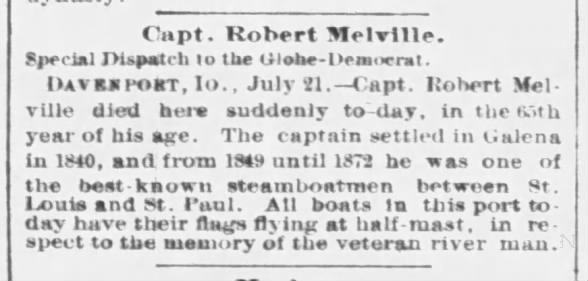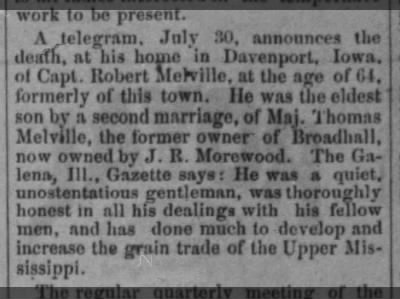 |
| Sketches of Middlesex Husbandry - Boston Courier, October 13, 1846 |
As shown previously on Melvilliana,
Robert Melvill's 1850 farm report, long attributed to his cousin Herman Melville, in fact borrowed extensively from Joseph T. Buckingham's 1846 report to the Society of Middlesex Husbandmen and Manufacturers. Joseph Tinker Buckhingham was editor of the
Boston Courier where the original farm report first appeared on October 13, 1846 under the heading
Without knowing about the 1846 source, Jay Leyda in “White Elephant vs. White Whale,” Town and Country Volume 101 (August 1947) first made the case for Herman Melville's authorship of the 1850 report on Berkshire agriculture signed by Robert Melvill. But Robert's source-text had been printed over the signature of Joseph T. Buckingham in October 1846. In Berkshire County four years later, Robert Melvill signed a committee report that was deeply indebted to Buckingham's report on the progress of agriculture in Middlesex County. Bottom line, some Melvill or other in 1850 plagiarized from published writing attributed to Joseph T. Buckingham, editor of the Boston Courier. If Herman collaborated on the Berkshire report with Robert, then he was helping his cousin plagiarize. Unless he had also ghost-written for Buckingham. In which case, Herman Melville in 1850 would have found himself ghost-revising his own ghostwriting.
In the 1850 Berkshire report, Robert or Herman Melville made interesting revisions to the 1846 source-text. Some of these revisions are documented in another post:
https://melvilliana.blogspot.com/2016/09/more-on-1846-middlesex-source-for.html
Here I want to highlight additional 1850 revisions including the substitution of "beautiful" for "emerald."
1846 SKETCHES OF MIDDLESEX HUSBANDRY
There is one other feature in the system of improvement, to which the committee refer with pleasure and approbation, viz., the construction of barns, with cellars for the making of manure. A descriptive detail of all that the committee observed during the week occupied in their examination would consume more time than they have at their disposal; but they cannot omit the opportunity now presented to impress upon the minds of all their brethren the importance of saving all the ingredients that enter into the composition of that substance which renovates exhausted soil, and restores to the earth the nutritious particles which have been extracted from it by successive crops, —enabling Nature to reinvest herself in her emerald attire, and to present to her votaries her annual tribute of ambrosial flowers and golden fruits. The philosopher and the naturalist—and the farmer should be both—may take pleasure in contemplating the benign process by which ingredients, the most offensive to the human senses, are converted into articles that gratify the most delicate taste and pamper the most luxurious appetite. --Boston Courier, October 13, 1846.
1850 ROBERT MELVILL, REPORT OF THE COMMITTEE ON AGRICULTURE
Another material improvement, which came under the notice of the committee, and to which they allude with pleasure and approbation, is the superior construction of barns, by which not only the comfort of domestic animals is much increased, but greater conveniences for their care, and for the accumulation of manure are attained.
A description of all that the committee noticed during their tour, would extend this report much beyond its proper limits, but they cannot omit this opportunity to impress upon the minds of all their agricultural brethren, the importance of saving every ingredient that can be made to enter into the composition of that substance which renovates exhausted lands, and returns to earth those particles which have been drawn from it by successive crops; thereby enabling Nature to reinvest herself in her beautiful attire, and to present to her admirers her annual tribute of Flowers and Fruits. The greatest pleasure may be taken by the philosopher and naturalist, (and the farmer should be both.) in contemplating the benign process by which ingredients the most offensive to the human senses, are converted into articles that gratify the most delicate taste, and pamper the most luxurious appetite. --Pittsfield Culturist and Gazette, October 9, 1850; reprinted in the Pittsfield Sun on October 10, 1850.
 |
Robert Melvill's Report of the Committee on Agriculture
Pittsfield MA Culturist and Gazette - October 9, 1850 |
Emerald means green, plainly and conventionally. The association with attire is not uncommon, but it feels more poetic. Melville's poem
The Cuban Pirate figures the hummingbird's brightly colored feathers as "gemmed attire" with the radiance and beauty of gemstones including emerald:
Buccaneer in gemmed attire—
Ruby, amber, emerald, jet—
The 1850 revision modifies the quality of Nature's attire to make it less colorful and gem-like, but still lovely in a general way. In the same sentence, 1846 "votaries" become less zealously devoted "admirers" in revision. Deleted entirely in 1850 are two paradise-evoking adjectives, "ambrosial" and "golden." Pruning may have seemed especially desirable here since the main theme is the virtue of manure:
1846
... enabling Nature to reinvest herself in her emerald attire, and to present to her votaries her annual tribute of ambrosial flowers and golden fruits.
1850
... thereby enabling Nature to reinvest herself in her beautiful attire, and to present to her admirers her annual tribute of Flowers and Fruits.
These 1850 changes to the 1846 source-text by Robert or Herman Melville effectively "tone down the green" by deleting the descriptors
emerald,
ambrosial, and
golden. Taking out the word
emerald in Nature's "emerald attire" obviously removes the greenest thing in the passage. The change from
emerald to
beautiful practically illustrates the painter's motto ("bless me, what am I doing, I must tone down the green here") in the prose story of
Rip Van Winkle that leads to the poem
Rip Van Winkle's Lilac in
Weeds and Wildings. Melville's aesthetic there is wonderfully worked out by John Bryant in
Toning Down the Green: Melville's Picturesque, a chapter in
Savage Eye: Melville and the Visual Arts, edited by Christopher Sten (Kent State University Press, 1991) pages 145-161; see especially pages 158-160.
Melville's prose and verse takes on Rip Van Winkle in manuscript have been expertly edited on pages 107-115 in the 2017 Northwestern-Newberry Edition of
Billy Budd, Sailor and Other Uncompleted Writings. Another printed version is accessible via Google Books in Volume 16 of
The Works of Herman Melville.
Related posts:















